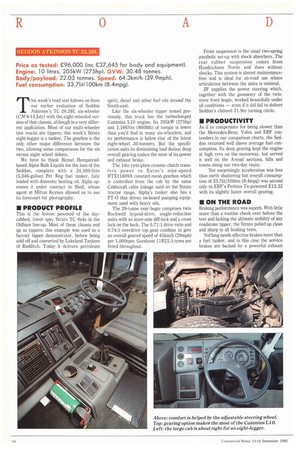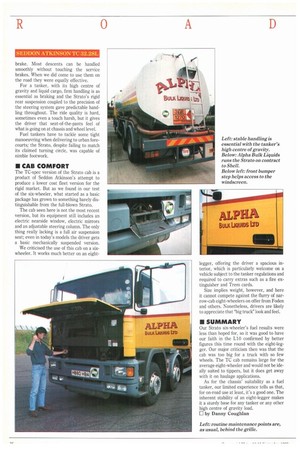T his week's road test follows on from our earlier evaluation
Page 36

Page 38

If you've noticed an error in this article please click here to report it so we can fix it.
of Seddon Atkinson's TC 26.28L six-wheeler (CM 9-15 July) with the eight-wheeled version of that chassis, although in a very different application. Most of our multi-wheeler test trucks are tippers; this week's Strato eight-legger is a tanker. The gearbox is the only other major difference between the two, allowing some comparisons for the six versus eight wheel debate.
We have to thank Hemel Hempsteadbased Alpha Bulk Liquids for the loan of the Seddon, complete with a 24,300-litre (5,346-gallon) Pet Reg fuel tanker, fully loaded with domestic heating oil. Alpha operates it under contract to Shell, whose agent at Milton Keynes allowed us to use its forecourt for photography.
• PRODUCT PROFILE
This is the lowest powered of the daycabbed, lower spec Strato TC 8x4s in the Oldham line-up. Most of these chassis end up as tippers; this example was used as a factory tipper demonstrator, before being sold off and converted by Lakeland Tankers of Redditch. Today it delivers petroleum spirit, diesel and other fuel oils around the South-east.
Like the six-wheeler tipper tested previously, this truck has the turbocharged Cummins L10 engine. Its 205kW (275hp) and 1,166Nm (8601bft) of torque is lower than you'd find in many six-wheelers, and its performance is below that of the latest eight-wheel 30-tonners. But the specification suits its diminishing load duties: deep overall gearing makes the most of its power and exhaust brake.
The 14in twin-plate ceramic clutch transfers power to Eaton's nine-speed RTX11609A constant-mesh gearbox which is controlled from the cab by the same Cablecraft cable linkage used on the Strata tractor range. Alpha's tanker also has a P1-0 that drives on-board pumping equipment used with heavy oils.
The 20-tonne rear bogie comprises twin Rockwell hypoid-drive, single-reduction axles with an inter-axle diff-lock and a cross lock on the back. The 5.71:1 drive ratio and 0.74:1 overdrive top gear combine to give an overall geared speed of 45km/h (29mph) per 1,000rpm. Goodyear 11R22.5 tyres are fitted throughout. Front suspension is the usual two-spring parabolic set-up with shock absorbers. The rear rubber suspension comes from Hendrickson Norde and does without shocks. This system is almost maintenancefree and is ideal for on-road use where articulation between the axles is minimal.
ZF supplies the power steering which, together with the geometry of the twinsteer front bogie, worked beautifully under all conditions — even if it did fail to deliver Seddon's claimed 21.9m turning circle.
• PRODUCTIVITY
As if to compensate for being slower than the Mercedes-Benz, Volvo and ERF contenders in our comparison charts, the Seddon returned well above average fuel consumption. Its deep gearing kept the engine at high revs on the motorway, but served it well on the A-road sections, hills and towns along our two-day route.
Not surprisingly acceleration was less than earth shattering but overall consumption of 33.7lit/100km (8.4mpg) was second only to RF's Perkins Tx-powered E12.32 with its slightly faster overall gearing.
• ON THE ROAD
Braking performance was superb. With little more than a routine check over before the test and lacking the ultimate stability of any roadstone tipper, the Strato pulled up clean and sharp in all braking tests.
Nothing needs effective brakes more than a fuel tanker, and in this case the service brakes are backed by a powerful exhaust brake. Most descents can be handled smoothly without touching the service brakes. When we did come to use them on the road they were equally effective.
For a tanker, with its high centre of gravity and liquid cargo, firm handling is as essential as braking and the Strato's rigid rear suspension coupled to the precision of the steering system gave predictable handling throughout. The ride quality is hard, sometimes even a touch harsh, but it gives the driver that seat-of-the-pants feel of what is going on at chassis and wheel level, Fuel tankers have to tackle some tight manoeuvring when delivering to urban forecourts; the Strato, despite failing to match its claimed turning circle, was capable of nimble footwork,
• CAB COMFORT
The TC-spec version of the Strato cab is a product of Seddon Atkinson's attempt to produce a lower cost fleet version for the rigid market. But as we found in our test of the six-wheeler, what started as a basic package has grown to something barely distinguishable from the full-blown Strato.
The cab seen here is not the most recent version, but its equipment still includes an electric nearside window, electric mirrors and an adjustable steering column. The only thing really lacking is a full air suspension seat; even in today's models the driver gets a basic mechanically suspended version.
We criticised the use of this cab on a sixwheeler. It works much better on an eight legger, offering the driver a spacious interior, which is particularly welcome on a vehicle subject to the tanker regulations and required to carry extras such as a fire extinguisher and Trem cards.
Size implies weight, however, and here it cannot compete against the flurry of narrow-cab eight-wheelers on offer from Foden and others. Nonetheless, drivers are likely to appreciate that "big truck" look and feel.
• SUMMARY
Our Strato six-wheeler's fuel results were less than hoped for, so it was good to have our faith in the L10 confirmed by better figures this time round with the eight-legger. Our major criticism then was that the cab was too big for a truck with so few wheels. The TC cab remains large for the average eight-wheeler and would not be ideally suited to tippers, but it does get away with it on haulage applications.
As for the chassis' suitability as a fuel tanker, our limited experience tells us that, for on-road use at least, it's a good one. The inherent stability of an eight-legger makes it a sturdy base for any tanker or any other high centre of gravity load.
0 by Danny Coughlan




















































































